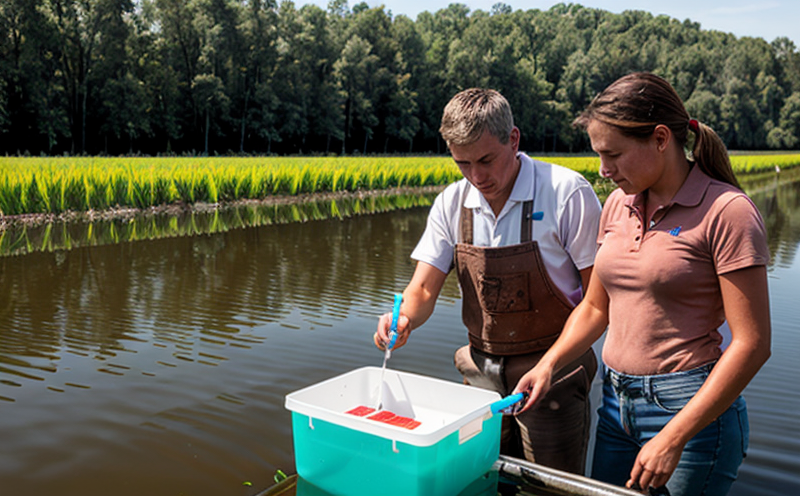Fungicide Residues Testing in Agricultural Water
The presence of fungicides in agricultural water can have significant implications for both environmental health and crop productivity. Ensuring that fungicide residues are within acceptable limits is crucial to prevent contamination, protect ecosystems, and comply with regulatory standards. This service focuses on the accurate determination of fungicide residues in irrigation water samples collected from various agricultural settings.
Fungicides play a vital role in controlling fungal diseases in crops; however, improper use can lead to their accumulation in soil and water systems. Over time, these residues may affect non-target organisms such as beneficial insects or aquatic life, potentially leading to biodiversity loss and reduced water quality. Therefore, regular monitoring of fungicide levels is essential.
Our laboratory utilizes advanced analytical techniques to provide reliable results that meet international standards like ISO 17254:2019 for pesticide residues in food and feed. The testing process begins with the collection of water samples from specified locations within farms or irrigation systems. These samples are then transported back to our facility where they undergo rigorous preparation steps before analysis.
The analytical procedures involve several key stages including extraction, clean-up, and detection using Liquid Chromatography coupled with Mass Spectrometry (LC-MS/MS). This approach ensures high sensitivity and specificity necessary for quantifying trace amounts of fungicides even at extremely low concentrations. Once the analyses are complete, comprehensive reports detailing findings along with comparison against established thresholds will be provided.
Understanding how these residues behave in different environments helps inform best practices for application rates and timing which can minimize unwanted impacts while maintaining effective disease control measures. By partnering with us on this critical aspect of agricultural management, you gain valuable insights into optimizing your operations without compromising safety or sustainability goals.
Scope and Methodology
Sample Collection: Water samples should be collected from points where irrigation water contacts crops but has not yet been applied to the field. This ensures that any residues present are reflective of what might be found in contact with plants during use.
| Parameter | Description | Standard |
|---|---|---|
| Fungicide Residue Levels | Detect trace amounts of fungicides present in the sample | ISO 17254:2019 |
| Water pH Level | Ensure proper extraction conditions for subsequent analysis steps | ASTM D6389-10 |
| Total Organic Carbon (TOC) | Determine potential interference from organic matter during extraction | EN 14872:2005 |
Preparation: Extracted water samples are concentrated using solid phase extraction cartridges followed by derivatization if required. This step enhances detection sensitivity and improves signal-to-noise ratios.
Detection: Using LC-MS/MS enables precise quantification of multiple fungicides simultaneously across the spectrum, allowing for more robust assessments than single analyte methods.
Quality and Reliability Assurance
- Use certified reference materials to calibrate instruments regularly.
- Implement standard operating procedures (SOPs) that outline all aspects of sample handling, preparation, and analysis.
- Conduct internal audits monthly to verify adherence to these SOPs.
- Participate in proficiency testing programs organized by recognized bodies such as AOAC International or EPA.
The combination of stringent QC protocols and cutting-edge instrumentation guarantees accurate measurements that reflect true concentrations rather than instrumental artifacts. This level of precision ensures trustworthiness among stakeholders including regulatory agencies, farmers, and consumers alike.
Customer Impact and Satisfaction
Accurate fungicide residue testing supports informed decision-making regarding pesticide usage practices. Farmers can adjust their application strategies based on actual field conditions rather than relying solely on manufacturer recommendations which may vary widely depending on local climate, soil type, and crop variety.
By ensuring compliance with regulatory limits, our service helps protect downstream ecosystems from unnecessary contamination while promoting sustainable farming methods that enhance long-term productivity. Positive feedback from satisfied clients attests to the reliability and value added by this specialized testing service.





